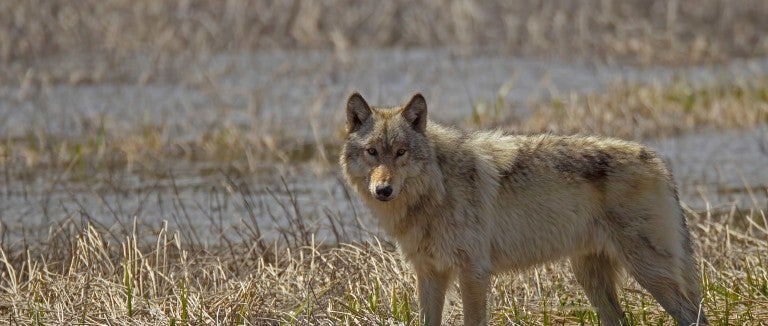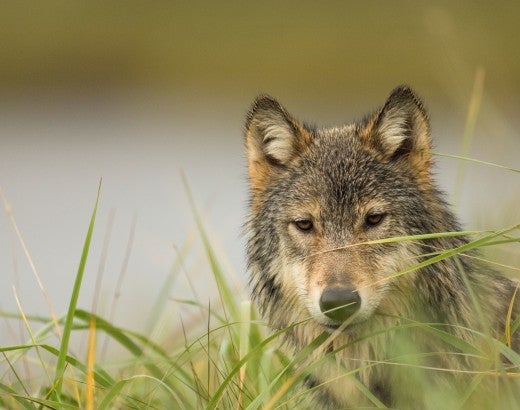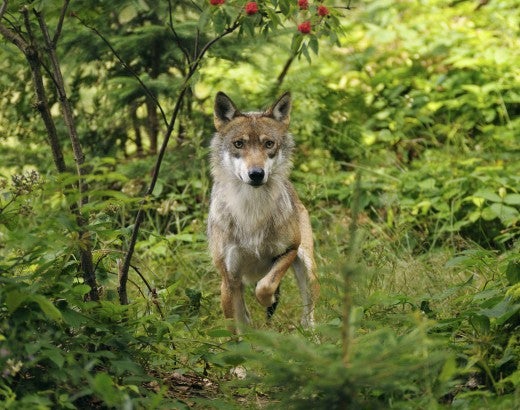Update May 3, 2024: A recent poll conducted by Remington Research Group for the Humane Society of the United States shows overwhelming voter disapproval of currently permitted methods for pursuing and killing wildlife in Wyoming. Among other findings, it shows that 71% of Wyoming voters, including majorities across all political parties and ideologies, believe the actions in this wolf incident are animal cruelty.
Earlier this month, we reported on a gut-wrenching story out of Wyoming, about a man who injured a wolf by running her down with a snowmobile, taped her mouth shut, paraded the terrified animal around a local bar and posed for photos with her before killing her. I’m often hesitant to share such horrific cases because the violence and indifference to animal life can feel gratuitous, even hopeless. And the authorities’ handling of this case reinforced that feeling for me. The alleged perpetrator of these vile and depraved acts was fined $250, a veritable slap on the wrist, for “illegal possession” of a wild animal.
But there is hope, and we must remember that through even the most difficult cases of animal cruelty. The accumulating coverage since this case began to receive national attention, and the outcry of many groups, such as Wyoming Wildlife Advocates, Wolves of the Rockies and Wyoming Untrapped, and members of the public has shown that people simply won’t tolerate such cruelty toward animals, whether domestic or wild. And the demand for justice and meaning in this case has become so strong that we may have turned a corner in public perceptions of cruelty when it comes to wild animals.
HSUS staff attended a recent meeting of the Wyoming Game and Fish Commission, joined by hundreds of wildlife advocates, scientists, veterinarians, responsible hunters and concerned members of the public in speaking out against this horrific act. People expressed concern about Wyoming’s legal and regulatory framework that allows such wanton cruelty to occur. Our experts in the HSUS Wildlife Protection department are also working with Wyoming groups to advance crucial policy reform at the state level.
We were pleased to see the letter sent by a number of Wyoming organizations to the County Attorney and Sheriff of Sublette County, with legal research and drafting assistance from attorneys in our Animal Protection Law department. In it they argue that authorities can and should prosecute the individual who committed these actions under both misdemeanor and felony cruelty charges. We are encouraged that an active investigation is ongoing.
Such an extreme case should lead us all to consider more deeply what responsibilities we have to protect animals, and how such protections can be encoded through our legal system and applied. I have never seen a case that so clearly exposes the disconnect between animal cruelty laws and their application. Since the advent of animal protection, our cruelty laws have too often excluded certain species and entire areas of animal exploitation—from trophy hunting to industrial animal agriculture—from basic consideration.
Usually, the discussion of cruelty within the wildlife context centers on what constitutes responsible hunting practices, which includes the concept of “fair chase,” meaning an animal being hunted has a reasonable chance to escape. But in this case, the wolf’s suffering was directly related to the nearly unlimited freedom people have to kill animals in this part of the state. This mind-boggling 85% of Wyoming is designated as the “predator zone,” where wolves, coyotes and other species, including even domestic cats defined by the state as “stray,” can be killed by any means at any time. This case involved a moral perversion that was chilling in its heartlessness, and that simply is animal cruelty.
The failure of Wyoming’s policies to prevent this act of cruelty must be viewed against the backdrop of the escalating war on wolves in the Northern Rockies states, underscoring the urgent need for the reinstatement of federal protections for wolves under the Endangered Species Act. Earlier this month, we sued the federal government for denying these protections, and we are hopeful that the court will force a reconsideration of the issue. In the meantime, there is much to be done at the state level to better protect wolves from incidents like this.
The U.S. is a country full of animal lovers. Dogs, especially, have become treasured and protected members of so many people’s families. Yet, when it comes to dogs’ ancestral relatives, wolves and coyotes, there is a kind of moral blind spot that obscures our like obligations of responsibility and care, or worse, impedes our ability to take action on their behalf. Can it really be in 2024 that there are so many among us who still want to see their extirpation?
To say this wolf did not die in vain if these protections are established would be to admit how truly dismal our cultural attitudes toward wolves still are. Such torment and pain should never need to happen to an animal for her species to become better protected. And yet, that may be where we are now.
This era of such callous indifference to the suffering of wolves needs to end. We must double down on our work to help wolves and other wildlife who are so dependent on our mercy and will for their survival.
Follow Kitty Block @HSUSKittyBlock.



